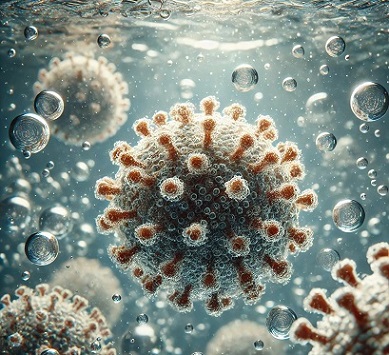Nikhil Prasad Fact checked by:Thailand Medical News Team Jul 02, 2024 9 months, 3 weeks, 3 days, 5 hours, 18 minutes ago
COVID-19 News: Understanding the Decay of SARS-CoV-2 in Water
As the COVID-19 pandemic continues to shape global health policies and practices, the scientific community has turned its focus to various aspects of the SARS-CoV-2 virus. A recent study by researchers from the United States Environmental Protection Agency (EPA) and CSIRO Land and Water that is covered in this
COVID-19 News report, investigated the decay characteristics of infectious SARS-CoV-2 and its viral RNA in different water environments. This research has significant implications for public health, particularly concerning the handling of wastewater and the use of water resources for recreation and irrigation.
 Decay Dynamics of SARS-CoV-2 in Various Waters
Image - AI Generated
Why Study SARS-CoV-2 in Water?
Decay Dynamics of SARS-CoV-2 in Various Waters
Image - AI Generated
Why Study SARS-CoV-2 in Water?
SARS-CoV-2, the virus responsible for COVID-19, is primarily known for its airborne transmission. However, it is also excreted in feces and has been frequently detected in wastewater worldwide. Understanding how long the virus remains infectious in water can help assess the risks associated with wastewater handling and recreational activities in contaminated waters.
Research Methodology
The research team collected samples from various water sources, including primary treated wastewater, final dechlorinated wastewater, lake water, and marine water. These samples were then inoculated with SARS-CoV-2 and incubated at three different temperatures: 4°C, 25°C, and 37°C. The study monitored the decay of infectious SARS-CoV-2 and viral RNA over 15 days, with samples analyzed for infectious virus and viral gene copies using plaque assays and reverse transcriptase quantitative polymerase chain reaction (RT-qPCR) assays, respectively.
Key Findings
-Temperature's Impact on Virus Decay: The study found that temperature significantly affects the decay rate of infectious SARS-CoV-2. At 37°C, no infectious virus was detected after 24 hours in any of the water types, whereas the virus remained detectable for up to 360 hours (15 days) at 4°C.
-Water Type Influence: Primary treated wastewater showed a faster decay of infectious SARS-CoV-2 compared to other water types. This was attributed to the presence of chemicals and particulates in the wastewater that might degrade the virus.
-Viral RNA Persistence: Unlike the infectious virus, viral RNA persisted throughout the study period, regardless of the water type and temperature. This suggests that while the virus may no longer be infectious, its genetic material remains detectable for an extended period.
-Assay Differences: The study also highlighted differences in the decay rates of viral RNA detected by two RT-qPCR assays
targeting different regions of the virus's nucleocapsid protein gene. The N2 gene target decayed faster at elevated temperatures compared to the N1 target, which has implications for assay selection in wastewater-based epidemiology (WBE).
Public Health Implications
-Wastewater-Based Epidemiology
The persistence of viral RNA in wastewater supports the use of wastewater-based epidemiology to monitor SARS-CoV-2 infection rates in communities. This method can provide early warning signs of outbreaks and help track the spread of the virus without relying solely on clinical testing.
-Recreational Water Use
Understanding the decay dynamics of SARS-CoV-2 in different water environments is crucial for assessing the risks associated with recreational activities in contaminated waters. While the risk of transmission through water is considered low, the study's findings can help inform guidelines and safety measures for public health protection.
-Handling and Disposal of Wastewater
The rapid decay of infectious SARS-CoV-2 at higher temperatures suggests that standard wastewater treatment processes, which often involve elevated temperatures, are effective in reducing the risk of virus transmission. However, the persistence of viral RNA underscores the importance of proper handling and disposal practices to prevent environmental contamination.
Future Research Directions
While this study provides valuable insights into the decay characteristics of SARS-CoV-2 in water, further research is needed to explore the effects of other environmental factors such as pH, sunlight, and the presence of other microorganisms. Additionally, studies on different SARS-CoV-2 variants and their behavior in water can help refine public health strategies and wastewater treatment protocols.
Conclusion
The research findings shed light on the decay dynamics of SARS-CoV-2 in various water environments. The findings highlight the critical role of temperature and water type in influencing the virus's persistence and offer important implications for public health practices. As we continue to navigate the challenges posed by the COVID-19 pandemic, such studies are essential for developing informed strategies to protect public health and manage water resources effectively.
The study findings were published in the peer reviewed journal: Science of The Total Environment.
https://www.sciencedirect.com/science/article/abs/pii/S0048969724045273
For the latest
COVID-19 News, keep on logging to Thailand Medical News.
Read Also:
https://www.thailandmedical.news/news/breaking-news-covid-19-research-shows-that-sars-cov-2-coronavirus-can-survive-in-water-for-up-to-25-days-and-could-also-be-water-borne
https://www.thailandmedical.news/news/h5n1-can-survive-in-various-water-sources-including-sea-water-for-up-to-12-days-at-22-to-35-degrees-celsius
https://www.thailandmedical.news/news/highly-pathogenic-avian-influenza-h5n1-viruses-can-also-spread-via-water-borne-transmissions
